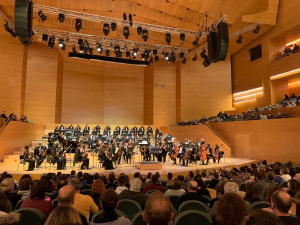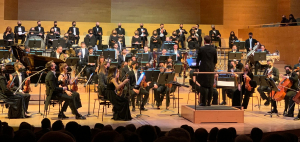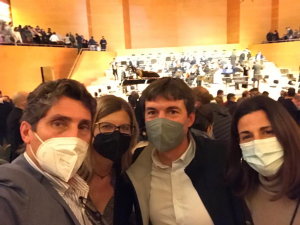Concert ‘Great Choirs by Morricone, Zimmer & Williams’ in Barcelona – Summary
Organized by the Excelentia Foundation, the Royal Film Concert Orchestra led by Fernando Furones, and with the participation of the RFCO Choir, offered on Sunday, February 20 at L’Auditori in Barcelona, a concert dedicated to the great choral works of cinema, focusing mainly on composers Ennio Morricone, Hans Zimmer, and John Williams (read more).
Our colleague Coque Cano attended the concert and brings us this exclusive article for SoundTrackFest.
Film choirs
Film music concerts have been covering, for some time now, a niche market with a different audience and mostly not usual audiences in concert halls.
This has recently led to the creation of several orchestras dedicated mainly to offering this type of concerts, touring throughout Spain and even Europe. Something quite new and that seems to have had a favorable and even enthusiastic response, although for this, obviously, you have to resort to “popular” composers such as John Williams, Ennio Morricone, and Hans Zimmer.
This is the case of the Film Symphony Orchestra (FSO) conducted by Constantino Martínez Orts (who usually dresses in concerts with a tunic similar to Neo’s suit in The Matrix), and the Royal Film Concert Orchestra (RFCO), created and supervised by the Excelentia Foundation (which also has the Santa Cecilia Classical Orchestra and the Delica Chamber Orchestra, both dedicated to a classical repertoire), or even the project initiated by Fernando Furones together with Elaine Lizardo called Valencia Film Orchestra.
Well, the concert in question was precisely one of those that are part of the tour promoted by the Excelentia Foundation with the RFCO, conducted for the occasion by the aforementioned Fernando Furones (who is also a film music composer, being a regular collaborator of director Fernando Colomo), which a priori already guaranteed experience at the music stand and with the orchestra. In this case and as a distinctive note, the concert offered themes of film music in which the choirs have a special relevance, making the repertoire somewhat more interesting than usual, but without too many surprises.
The concert, held on Sunday, February 20, 2022 at the splendid Auditori in Barcelona, was entitled “Great Choirs by Morricone, Zimmer & Williams”, although very popular pieces by Vangelis, James Horner, or Howard Shore were also performed, which should have obliged to provide the corresponding information in the digital program, which did not include the authors of the different themes.
Even to alleviate this problem, the conductor could have introduced the pieces briefly, but, except before the only encore of the evening, he did not address the audience, which, in my opinion, turned the concert into a mere continuous listening of themes that generated a feeling of haste and a certain distance from the audience. Undoubtedly, something that could be improved in order to make this kind of events less routine.
It should be noted that this distance was partly diluted by the gestural way of conducting of Furones, who at times almost danced to the sound of the pieces. We may like it more or less, but he really managed to transmit his enthusiasm to the audience.
As for the orchestra and choir of the RFCO, they were at a good level, demonstrating that they had the repertoire very well rehearsed, although sometimes lacked some presence in the strings and even some violin solo (in the theme of the Hobbits from The Lord of the Rings, for example), was like a bit low, and that considering that we were located in the stalls, a few meters from the stage. But I insist, in general terms, a very good performance by the musicians and especially by the choir, which more than fulfilled our expectations.
The program:
The concert opened precisely with one of the pieces that were not by any of the three authors that served as a claim, namely the theme “Titans” composed by Vangelis for the film “Alexander” by Oliver Stone, which has a score with an abundance of choirs, with other equally powerful and epic themes such as “Across the mountains”. A good start and great performance by the RFCO choir.
The second theme of the evening was “Chevaliers de Sangreal” composed by Hans Zimmer for “The Da Vinci Code”, a piece with the German composer’s typical elegiac crescendo, which is one of his most recognizable and popular works.
After this staging with two such solemn and epic pieces, it was the turn of another great score for choirs by Vangelis, equally powerful and well-known. We are talking about the soundtrack of Ridley Scott’s film “1492: Conquest of Paradise”, and more specifically the theme “Conquest of Paradise”. The audience enjoyed a good version, making clear the passion of Furones with the baton.
The fourth piece of the repertoire was not actually a soundtrack, but the theme “Heart of Courage” composed to accompany movie trailers, used among others, in “The Chronicles of Narnia”. A theme composed by Thomas J. Bergersen through his music production company “Two Steps from the Hell”, specialized in this type of music, which has quickly become popular and has an obvious ‘Zimmerish’ style. Good intervention of the cellos.
After this first part came the turn of the much more classical John Williams, which obviously forced the orchestra to a greater technical and interpretative effort, with estimable results, despite some slight misalignments of the trumpets (something usual with the American composer, which we have even seen in orchestras as important as the London Symphony Orchestra or the Vienna Philharmonic).
Initially there were three pieces in a row, although later a couple more were performed. It began with the “End Credits” from Jurassic Park, which was one of the most applauded themes of the concert, demonstrating the degree of notoriety it has among the general public. Followed came the superb “Battle of the heroes” from Star Wars Episode III, which brought out the best of the orchestra with a perfect use of the choirs. And ended with the elegiac nobility of the “Hymn of the fallen” composed by Williams for the end credits of Steven Spielberg’s masterpiece “Saving Private Ryan”.
Except for the Jurassic Park theme, the other two are not usually played in the maestro’s concerts, so their inclusion was appreciated. Undoubtedly, part of the best of the event, also at the interpretative level.
After Williams, came another composer who usually offers challenges to the orchestra, and one of the great symphonists of cinema: James Horner. A name that could not be missed, although being a concert dedicated to the choirs in the cinema, it is strange not to have heard his most remarkable score in this aspect, such as “Glory”. Obviously the wink towards the public was sought, being the first piece chosen the beautiful “For the love of a princess” from “Braveheart” that for the occasion reinforced the presence of choirs, less evident in the original.
Then it was the turn of the third of the composers who “sold” the concert: Ennio Morricone. His first contribution was the hymn entitled “Romanzo” from the film “Novecento”, which the choir made their own but which was nevertheless somewhat blurred with a somewhat extemporaneous entrance of the orchestra. In any case, a memorable theme and the first appearance of the Roman maestro, after which Williams was again interpreted.
Harry Potter was chosen and although the program included the piece “Double Trouble”, which is indeed a choral piece, in reality the much more typical and well-known “Hedwig’s theme” was performed, and the choir remained silent, although it would not be the first time during the evening.
Then it was time again for Morricone, this time with his most recognizable work and one of the best scores for choirs ever composed. It was a suite from “The Mission”, which had a great reception in the Auditori and was an effective review of the best moments of this great work.
After such an emotional piece, came two recent works by Hans Zimmer and James Horner, obviously very different from each other: “Inception” is another of those repetitive crescendo motifs so familiar to the German composer, which offered a moment of spiritual air with a good appearance of the choirs. While the suite from “Avatar” (very similar to the one performed at the “Hollywood in Vienna” concert in honor and with the presence of the composer from Los Angeles), was on a good note, and showed that, despite not being considered one of Horner’s definitive works, it is a great work with a spectacular use of the choirs. The orchestra was very good, especially in this second theme.
The third and last piece by Ennio Morricone was the famous “The ecstasy of gold” composed for the no less popular Sergio Leone’s film “The good, the bad and the ugly”. A very particular use of choirs that delighted the audience.
Next the orchestra played a suite from “The Lord of the Rings” which was a slight disappointment for two reasons. The first because it was a rather not gracious concatenation of the most famous themes from The Fellowship of the Ring (basically the Hobbit’s theme, the Fellowship theme, the ring theme and the Uruk-Hai theme), and the second because the occasion was not used to include any of the multiple choral pieces written by Howard Shore for the trilogy (e.g.: “Lothlorien”, “the seduction of the ring”, “Rivendell”, “Khazad-dum”, “Forth Eorlingas”…), which were precisely much more suitable for the type of concert that was advertised.
Following this strange introduction of non-choral themes, the main theme from the hit HBO TV series “Game of Thrones” was performed, composed by a lucky Ramin Djawadi in his most recognizable work. The younger audience appreciated this television interlude.
The concert program ended with Hans Zimmer‘s famous “Gladiator”, which had a brief appearance by the choirs and enjoyed a fine performance by the RFCO.
Once the concert was “finished“, Fernando Furones addressed the audience for the first and last time, asking in perfect Catalan if the Auditori wanted a last complimentary piece, getting an enthusiastic affirmative answer that led us to the overwhelming choral opening of “Duel of the fates” composed by John Williams for Star Wars Episode I. Great end of party that had an expected point since it was part of the poster with which the concert was promoted (although it also had “Across the stars” from Episode II, which was not interpreted), offering one of the best performances of the evening. Finishing with Williams is always a guarantee and in a concert dedicated to choirs in film, and this piece was a perfect choice.
In short, this kind of concerts are a good example of the acceptance of film music among the general public (although the Auditori was not full), and quality bets like that of the Royal Film Concert Orchestra deserve our applause.
Article and pictures by Coque Cano















